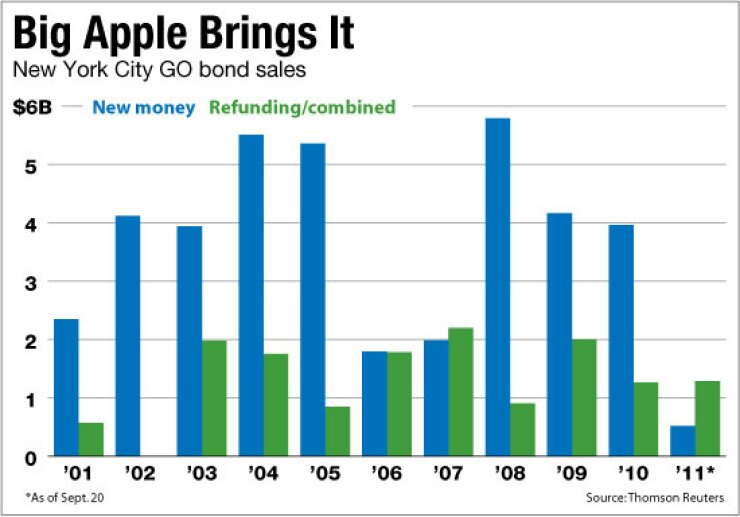
New York City plans to issue $650 million of new-money general obligation bonds next week, followed by additional transactions in October to restructure its variable-rate portfolio.
The city on Friday will begin a two-day retail order period for $585 million of tax-exempt, fixed-rate bonds, with the institutional sale scheduled for Tuesday, when New York also plans to price $65 million of taxable GOs.
Book-running senior manager Siebert Brandford Shank & Co. will lead the sale of fiscal 2012 tax-exempt Series D, Subseries D-1 bonds and the taxable fixed-rate fiscal 2012 Series D, Subseries D-2.
Bank of America Merrill Lynch, Citi, JPMorgan, and Morgan Stanley are co-senior managers.
Sidley Austin LLP is bond counsel. Orrick, Herrington & Sutcliffe LLP is disclosure counsel. Hawkins Delafield & Wood LLP is underwriters’ counsel.
Public Resources Advisory Group and A.C. Advisory Inc. are the city’s financial advisors.
The bonds will mature from 2013 to 2032 and interest will be payable on each April 1 and Oct. 1, beginning in 2012.
Moody’s Investors Service rates New York’s GO bonds Aa2, while Standard & Poor’s and Fitch Ratings both rate them AA.
According to the preliminary official statement for the fixed-rate bond deal, New York City in October plans to convert about $168 million of variable-rate demand bonds to fixed-rate bonds, while simultaneously issuing $125.2 million of new variable-rate bonds secured by a letter of credit from Bank of New York Mellon.
Recently completed bond transactions by the city include the New York City Municipal Water Finance Authority’s $451 million of second resolution, fixed-rate new-money and refunding bonds on Sept. 13, and the New York City Transitional Finance Authority’s $1.05 billion of future tax-secured, fixed-rate conversion and refunding subordinate-lien bonds on Aug. 4.
While the city is making its latest plans to sell debt, the region’s mass transit agency, the Metropolitan Transportation Authority, was catching heat Wednesday over its $14.8 billion capital borrowing program.
“Before taking on nearly $15 billion in new debt, the MTA must present the public with the facts about the potential long-term implications of this new borrowing on services, fares and budget gaps,” New York State Treasurer Thomas DiNapoli said in a report.
He said the state authority’s July financial plan faces several significant budgetary risks, including collective-bargaining uncertainty, the need for cost-reduction targets, a sluggish economy, and possible additional cuts in state aid.
Another challenge for the MTA, DiNapoli added, is filling the $9.9 billion funding gap in the last three years of its capital program that covers 2010 through 2014.
“Even with biennial fare and toll increases of 7.5% in 2013, 2015, and 2017, the MTA could still face budget gaps rising from $600 million in 2016 to $1.2 billion in 2018,” he said.
At its July meeting, when the MTA introduced the increased borrowing as part of its preliminary budget for fiscal 2012 and four-year financial plan, board vice chairman Andrew Saul called the authority’s rising debt “an absolute ticking time bomb,”
Fitch on Sept. 8 downgraded its rating on $14.3 billion of outstanding revenue bonds issued for the MTA to A from A-plus, and lowered the underlying long-term rating of Triborough Bridge and Tunnel Authority general and subordinate bonds to AA-minus and A-plus, respectively, from AA and AA-minus. The Triborough authority is an MTA entity.
The rating agency cited pension obligations and escalating debt from the capital program.
Gene Russianoff, a New York attorney and spokesman for the Straphangers Campaign, a ridership lobbying group, said the MTA’s borrowing “will likely fuel major hikes or service cuts on subway, bus, and commuter rail lines in the years to come.”
“While voicing support for the MTA’s vital capital program, the comptroller’s report raised concerns about the impact of increased debt service from the MTA’s proposed capital funding plan on the operating budget,” authority spokesman Aaron Donovan said in a statement.
“However, it failed to note that the increased debt service would be covered by reallocating revenues included in its existing budgets and earmarked for pay-as-you-go capital,” he said. “The MTA’s plan would fully fund the 2010-2014 capital program without increasing the burden on the operating budget.”
The MTA’s finance committee will meet Monday, while its full board will convene Wednesday.
Chairman and chief executive Jay Walder will leave Oct. 21 to become CEO of MTR Inc. of Hong Kong, which operates rail systems in Asia and Europe.





